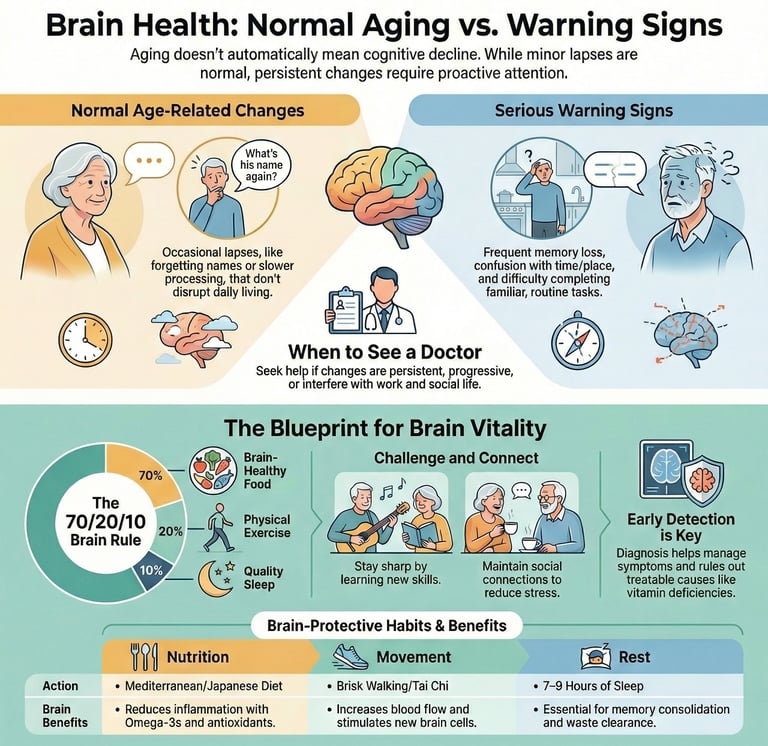Check requirements for Asia's Retirement Visas
Brain Health for Seniors: Keeping Your Mind Sharp and Vibrant
As we journey through life, especially into our golden years, one of the most common concerns that arises is the health of our brains and our cognitive abilities. The idea of "losing our marbles" or becoming "senile" can be a real worry. But here's the good news: just like our bodies, our brains can stay incredibly vibrant and sharp with the right care and attention. Aging doesn't automatically mean cognitive decline; in fact, many seniors maintain excellent mental acuity well into their later years.
So, let's explore what brain health means for seniors and how you can actively work to keep your mind thriving.
What is Brain Health and Cognition?
Brain health refers to the overall well-being of your brain, allowing it to function optimally. This includes your ability to:
Think clearly: Process information, solve problems, and make decisions.
Remember: Recall facts, events, and experiences.
Learn: Acquire new knowledge and skills.
Focus: Maintain attention and concentrate.
Communicate: Express thoughts and understand others.
Cognition is the mental process of acquiring knowledge and understanding through thought, experience, and the senses. It encompasses all these abilities. While some minor changes in memory (like occasionally forgetting a name or where you put your keys) are a normal part of aging, significant or persistent decline is not.
Common Concerns for Seniors: Understanding the Landscape
It's natural to worry about conditions that affect the brain as we age. While some changes are normal, it's important to know the difference between typical aging and signs that might need a doctor's attention.
Normal Age-Related Changes (Often Frustrating, but Usually Not Serious):
Occasional Memory Lapses: Forgetting where you put your glasses, or the name of someone you just met, but remembering it later.
Slower Processing Speed: Taking a bit longer to grasp new information, solve problems, or recall words.
Difficulty with Multitasking: Finding it harder to juggle several tasks at once compared to when you were younger.
These can be frustrating, but they usually don't interfere significantly with daily life.
More Serious Concerns: When to Take Action
Some changes in thinking, memory, or behavior are not a normal part of aging and could signal a more serious condition. These are often called cognitive diseases or mental health conditions that affect the brain.
Dementia (e.g., Alzheimer's Disease): This is a general term for a decline in mental ability severe enough to interfere with daily life. Alzheimer's is the most common cause.
Signs to Watch For:
Memory loss that disrupts daily life: Forgetting recently learned information, important dates or events, asking the same questions repeatedly.
Challenges in planning or solving problems: Difficulty following a recipe, managing bills, or concentrating.
Difficulty completing familiar tasks: Getting lost on a familiar route, struggling with a routine chore.
Confusion with time or place: Losing track of dates, seasons, or where they are.
Trouble understanding visual images and spatial relationships: Difficulty reading, judging distances, or recognizing faces.
New problems with words in speaking or writing: Struggling to follow or join a conversation, repeating themselves.
Misplacing things and losing the ability to retrace steps.
Decreased or poor judgment.
Withdrawal from work or social activities.
Changes in mood or personality: Becoming confused, suspicious, depressed, fearful, or anxious.
Depression and Anxiety: While not strictly cognitive diseases, these mental health conditions can significantly impact memory, concentration, and overall brain function, especially in seniors.
Signs to Watch For: Persistent sadness, loss of interest in activities, changes in appetite or sleep, fatigue, feelings of worthlessness, difficulty concentrating, excessive worry, restlessness, or panic attacks. These symptoms can sometimes be mistaken for dementia.
When Do You Need to Take Action?
It's crucial to distinguish between normal aging and signs that warrant a doctor's visit. If you, a family member, or a friend notice any of the following, it's time to consult a doctor:
Changes that are persistent and progressive: They happen frequently and seem to be getting worse over time.
Changes that disrupt daily life: They interfere with work, hobbies, managing finances, driving, or social interactions.
More than just occasional forgetfulness: Forgetting entire conversations or events, not just a detail.
Difficulty with problem-solving or planning that is new and unusual.
Significant changes in personality or behavior.
If you are worried: Trust your instincts. Even if it turns out to be nothing serious, getting peace of mind is important.
Early detection is key! While there may not be cures for all conditions, early diagnosis can help manage symptoms, plan for the future, and sometimes even slow progression. A doctor can perform tests, rule out other causes (like medication side effects, vitamin deficiencies, or infections), and provide guidance.
Strategies for a Sharp and Vibrant Brain
The good news is that many of the same healthy habits that benefit your body also benefit your brain! Think of it as a holistic approach to well-being.
Your Brain's Fuel: Food, Exercise, and Sleep
Remember the "70% Food, 20% Exercise, 10% Sleep" rule for overall health? This balance is equally vital for your brain.
1. Fuel Your Brain (The 70% Food Rule!): What you eat directly impacts your brain's performance. Focus on:
Mediterranean & Japanese Diets: These are consistently recommended for brain health, emphasizing Omega-3 fatty acids (from fish, nuts), antioxidants (from colorful fruits and veggies), whole grains, and healthy fats (olive oil, avocados).
Limit Processed Foods & Sugars: These can cause inflammation and hinder brain function.
Stay Hydrated: Water is essential for clear thinking.
2. Move Your Body (The 20% Exercise Rule!): Physical activity is a powerful brain booster.
Benefits: Exercise increases blood flow to the brain, delivers vital nutrients, stimulates the growth of new brain cells, and helps manage conditions like high blood pressure and diabetes that can harm brain health.
Recommended Activities: Brisk walking, swimming, cycling, dancing, Tai Chi, and strength training are all excellent.
Check out our recommendations for exercises and fitness programs for seniors.
3. Prioritize Sleep (The 10% Sleep Rule!): Quality sleep is when your brain repairs and recharges.
Benefits: Sleep is crucial for memory consolidation, clearing out waste products linked to diseases like Alzheimer's, and improving mood and focus.
Aim for 7-9 hours: Maintain a consistent sleep schedule and create a relaxing bedtime routine.
4. Challenge Your Brain (Mental Stimulation)
Your brain is like a muscle – use it or lose it!
Learn New Things: Take a class, learn a new language, play a musical instrument, or pick up a new hobby.
Engage in Puzzles & Games: Crosswords, Sudoku, jigsaw puzzles, chess, or strategy games. Check out our games for brain simulation for seniors.
Read Regularly: Challenge yourself with different genres and complex topics.
Stay Curious: Ask questions, explore new ideas, and engage in stimulating conversations.
5. Stay Socially Connected
Isolation and loneliness can negatively impact brain health.
Benefits: Social interaction lowers stress, reduces the risk of depression, and keeps your brain active and engaged.
Join Clubs & Groups: Participate in community activities, volunteer, or join hobby groups.
Maintain Relationships: Regularly connect with family and friends.
6. Manage Stress
Chronic stress can have detrimental effects on brain health over time.
Practice Mindfulness: Meditation, deep breathing exercises, or gentle yoga can help manage stress.
Spend Time in Nature: Being outdoors can reduce stress and improve mood.
Prioritize Relaxation: Make time for activities you enjoy that help you unwind.
The Bottom Line
Maintaining brain health in your senior years is an active process, not a passive one. By consistently nourishing your body with good food, staying physically active, getting enough quality sleep, challenging your mind, and fostering social connections, you're building a powerful defense against cognitive decline. Your brain is your most valuable asset for a fulfilling retirement – invest in it wisely!
Disclaimer: This article is for informational purposes only and is not a substitute for professional medical advice, diagnosis, or treatment. Always seek the advice of a qualified healthcare professional with any questions you may have regarding a medical condition.




Address
Blk 8 Cantonment Close
SIngapore